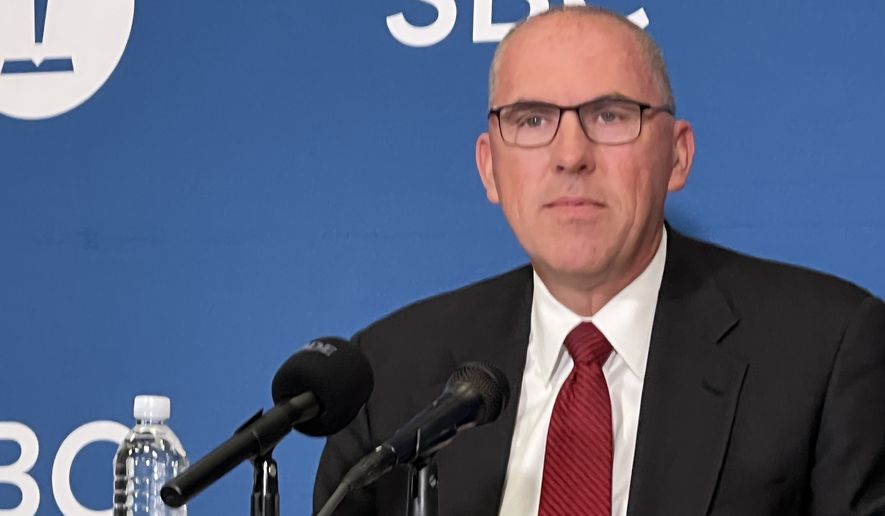ANAHEIM, California — The new president of America’s largest Protestant denomination declared Thursday that there would no longer be a “hunting ground” for sexual predators in Southern Baptist churches.
Because local churches are administratively autonomous, sexual predators have been able to move from one congregation to another, the Rev. Bart Barber told a news conference Wednesday, “from scandal to scandal, manipulating our system to hide from accountability and pick off the sheep one by one.”
The new leader promised reforms.
A blistering report released May 22 by Guidepost Solutions detailed hundreds of instances of sexual abuse by Southern Baptist Church pastors, lay members, and those at institutions such as colleges, universities and seminaries.
The abuses were disclosed after close to two decades of stonewalling by leaders who sometimes chastised survivors who cried out for recognition and help.
Mr. Barber, 52, senior pastor of the First Baptist Church of Farmersville, Texas, said he wants those decentralized congregations to “become, rather than a hunting ground in which predators brutalize their prey, a place where sexual predators are put on notice that the tables have turned and where the hunter is now the hunted.”
He declared that church administrative practices — known as “polity” among Southern Baptists and members of other denominations — must be turned against those who would injure church members.
“Predators have realized the vulnerabilities of our system; it is time for Southern Baptists to realize how nimble and resilient our Baptist polity can be to put sexual predators on notice that Southern Baptist churches are a dangerous place for them,” Mr. Barber said.
Elected late Tuesday to a one-year term as president of the 13.7-million-member denomination, Mr. Barber acknowledged the pressures he faces in addressing the sexual abuse crisis within the church and rebuilding membership, which has declined in recent years.
He said his first task will be to find and appoint members of an abuse reform task force charged with implementing the recommendations approved by delegates at the SBC’s annual business meeting on Tuesday.
Those moves, called “bare minimum” steps by the head of the outgoing sexual abuse task force, include spending $3 million to implement the panel’s recommendation of creating a database of “credibly accused” abusers and those who have been convicted. The data would be available to churches wishing to check on volunteers or prospective employees.
A further $1 million is to be spent establishing a victim care fund to provide counseling services to sexual abuse victims.
Both projects will be funded by Send Relief, a Southern Baptist Convention aid agency, and not from denominational money allocated for evangelism.
Mr. Barber said those who carry forward these plans will have to be “people who are trauma-informed and understand the needs of survivors. They’re also going to have to … understand Baptist polity very well. We’re going to need people who have strong relationships across the Southern Baptist Convention.”
The new president said the denomination also faces challenges in keeping members and congregations.
The group’s “Annual Church Profile,” released last month, showed a rise in individual baptisms — 154,701 baptisms in 2021, up 26% from the 123,160 reported during the pandemic-ravaged previous year — but also that membership fell substantially below the 14 million mark and roughly 1,500 congregations had left the SBC in the past five years.
Mr. Barber said some congregations still have members on the books who have decamped for other churches and that rigorous auditing of membership would yield more accurate results.
“We know that a great many of our churches don’t have as many people attending as we used to,” he said.
Mr. Barber said it wasn’t the SBC president who would bring people into local congregations.
“What we have to remind people is, we’re going to have to lean into our own churches,” he said. Local pastors will need to get members “excited about sharing the Gospel with folks that are around them. And it’s that local church emphasis that’s going to carry the way through.”
Taking the helm of a large denomination often means that the officeholder is propelled into a celebrity status that elevates their profile.
But Mr. Barber, who has held other leadership positions in the movement as a trustee on various boards, said these roles come at a cost.
“Every way that I’ve served Southern Baptists has left scars, every one that I’ve done it,” he said. “But this family of churches is worth it. It’s worth enduring some slings and arrows. It’s worth working through the difficulties that [is] the crass discourse that’s out there in the world [and] has come in our family churches.”
Mr. Barber said he negotiated with his church’s board to balance his responsibilities as a local pastor with those of a denominational leader.
“I’ve got two teenage kids. And I’ve got a church full of people who, you know, they expect me to be the one who preaches that funeral; they expect me to be the one who shows up when they get in the hospital,” he said.
He said his church has “set some reasonable parameters for the number of times in a given month that I can go off out of town and be somewhere and speak.”
Mr. Barber embarks on his new responsibility with an endorsement from one of his predecessors. The Rev. James Merritt, a former SBC president, said he came to know the new leader when they served together on the group’s resolution committee.
“I cannot speak highly enough of him,” Mr. Merritt said. “He was super sharp and a man of incredible integrity and great courage.”
• Mark A. Kellner can be reached at mkellner@washingtontimes.com.




Please read our comment policy before commenting.